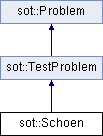|
| | Schoen (int dim) |
| | Constructor with k = max(2^dim, 500) More...
|
| |
| | Schoen (int dim, int k) |
| | Constructor for given k. More...
|
| |
| vec | lBounds () const |
| | Method for getting the lower variable bounds. More...
|
| |
| vec | uBounds () const |
| | Method for getting the upper variable bounds. More...
|
| |
| int | dim () const |
| | Method for getting the number of dimensions. More...
|
| |
| double | min () const |
| | Method for getting global minimum value. More...
|
| |
| vec | optimum () const |
| | Method for getting the global minimizer. More...
|
| |
| std::string | name () const |
| | Method for getting the name of the optimization problem. More...
|
| |
| double | eval (const vec &x) const |
| | Method for evaluating the objective function. More...
|
| |
| vec | evals (const mat &points) const |
| | Method for evaluating the objective function at multiple points. More...
|
| |
Schoen function
Function: \(f(x) = \displaystyle\frac{\displaystyle\sum_{i=1}^k f_i \displaystyle\prod_{j \neq i} \|x - z_j\|^{\alpha}}{ \displaystyle\sum_{i=1}^k \displaystyle\prod_{j \neq i} \|x - z_j\|^{\alpha}} \)
Domain: \( 0 \leq x_i \leq 1 \)
Minimum value: \(0\)
Minimizer: Randomly generated
Here \(z_j \in [0,1]^d\) for \(j=1,\dots,k\) are the locations of the stationary points and \(f_j \in \mathbf{R}\) are the values at these stationary points. The locations of \(z_j\) are generated uniformly and \(f_j\) are drawn from at \(U[0,100]\) distribution. We force \(f_1 = 0\) so the global minimum value is always 0 and is located at \(z_1\). The exponents \(\alpha\) are drawn from a \(U[2,3]\) distribution.
- Author
- David Eriksson, dme65.nosp@m.@cor.nosp@m.nell..nosp@m.edu

 Public Member Functions inherited from sot::TestProblem
Public Member Functions inherited from sot::TestProblem 1.8.11
1.8.11